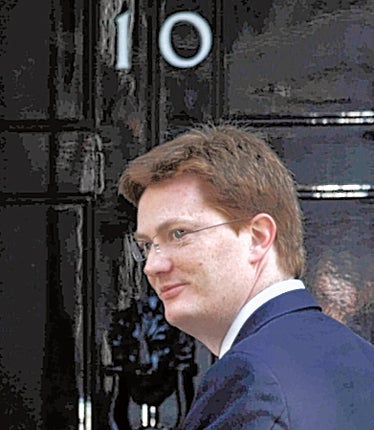Tories are urged to 'get used to' compromise as coalition unveils policies

David Cameron warned the Conservative Party and its supporters yesterday that some of its cherished policies would have to be dropped as the price of power and forming a coalition with the Liberal Democrats.
The Prime Minister and his Deputy, Nick Clegg, hailed a 32-page blueprint including about 400 policies as a sign of the coalition’s success in narrowing differences between their two parties to provide the stable, strong government Britain needs after its inconclusive election.
Amid growing concern among Tory MPs that some of their policies are being watered down, Mr Cameron admitted: “Clearly, we all going to have to get used to a new world – a world of coalition.” He added: “I don’t want to disappoint people later, I want to be clear now… Of course some things have to change – that’s a state of mind we have to get into, and all the party has to get into, and I think it’s down the road to doing so.”
Yesterday’s document saw a retreat from Tory plans to scrap Labour’s performance targets for the National Health Service and to bring in a UK Bill of Rights to replace the 1998 Human Rights Act, which incorporated the European Convention on Human Rights into UK law.
Mr Clegg agreed: “Compromises have, of course, been made on both sides, but those compromises have strengthened, not weakened, the final result.” He insisted that the coalition would provide “clarity and stability” that even single-party government had not delivered in the past.
The document’s last page included a crucial caveat – that not all of the policies might prove affordable in the five-year government envisaged by Mr Cameron and Mr Clegg. It said: “The deficit reduction programme takes precedence over any of the other measures in this agreement, and the speed of implementation of any measures that have a cost to the public finances will depend on decisions to be made in the comprehensive spending review.”
An early pointer to the swingeing cuts came with a commitment to slash Ministry of Defence running costs by at least 25 per cent, which could cost tens of thousands of jobs. The cost of NHS administration will be cut by a one third, with savings switched to “frontline” services.
The final prospectus, which is more detailed than the seven-page initial coalition agreement, follows tough behind-the-scenes negotiations led by Oliver Letwin, the Tory Cabinet Office minister, and Danny Alexander, the Liberal Democrat Scottish Secretary, who was formerly Mr Clegg’s chief of staff.
Some issues have proved too sensitive and will be the subject of reviews. After The Independent revealed yesterday that the new government agreed 11 such reviews in its first week, Mr Cameron appealed to the media not to be “churlish”. He said the number of sentences in the document starting with “we will” was “incredibly striking” and outnumbered reviews.
Yesterday’s document added to the list of commissions and committees looking into areas where the coalition partners may disagree. They include reviews of the effectiveness of raising the stamp duty threshold for first-time buyers; Tory plans for a £25,000 levy on non-domiciles who live in Britain but do not pay UK taxes on their overseas income; how to improve social care; the factors that can be taken into account by regulators ruling on proposed rules company takeovers; the operation of the Extradition Act and the treaty with the US on extradition; sentencing policy; legal aid; alcohol taxation; and police terms and conditions.
The coalition document provoked anger over plans to grant anonymity to rape defendants – a move contained in neither party’s election manifesto. Campaigners denounced the proposal as an “insult” to women which would turn the clock back 30 years.
Twenty-seven proposals for cleaning up the political system included a surprise plan to pay for all-postal primaries to select candidates in 200 safe seats when their MPs retired. The government also promised “early legislation” to give voters the power to “recall” MPs guilty of fraud or corruption.
Mr Cameron and Mr Clegg promised a free vote to repeal the Act banning hunting with dogs – an issue that resonates with many Tory MPs and voters in rural areas. But there was no indication how early it would take place in the five-year parliament.
The coalition partners agreed to try to part-privatise the Royal Mail after the previous government abandoned an attempt at a partial sale in the face of fierce trade union resistance and a Labour backbench rebellion.
Lib Dem MPs have been promised opt-outs from four policy commitments. They will not have to support the renewal of the Trident nuclear weapons system; the construction of new nuclear power stations; introducing tax breaks for married couples; and reforms to higher education funding which may include higher tuition fees.
The document includes a pledge that the Government “will never condone the use of torture”. William Hague, the Foreign Secretary, said a judicial inquiry into allegations of British complicity in torture by UK intelligence agents would announced in the next few days. Both the Tories and Lib Dems called for an inquiry while they were in opposition.
An inquiry may help to resolve the civil cases being brought by victims of alleged torture and rendition, and which the new administration has inherited. Government lawyers are thought likely to offer out-of-court settlements worth millions of pounds.
Join our commenting forum
Join thought-provoking conversations, follow other Independent readers and see their replies
Comments
Bookmark popover
Removed from bookmarks